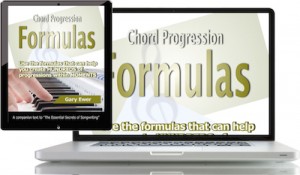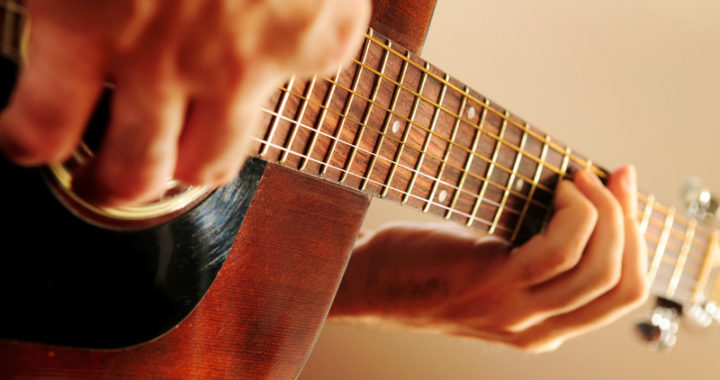Does this describe your own songwriting situation: You sit down with your guitar and start to strum, trying to come up with ideas for a new song. You find your fingers moving to the same chords — the ones your fingers usually like.
While you’re strumming, you become aware that you’re using the same basic rhythmic patterns that you usually favour. So you try to change those rhythms up a bit, trying to coax new ideas out.
You might come up with something new, but you’re bothered by the fact that even though it’s a new song, it sounds a lot like the last one — maybe even the last few — that you’ve written.
 “The Essential Secrets of Songwriting 10-eBook Bundle” has several eBooks devoted to chords, including “Chord Progression Formulas.” It will show you how to create dozens of progressions within moments. Great for any style or genre of songwriting.
“The Essential Secrets of Songwriting 10-eBook Bundle” has several eBooks devoted to chords, including “Chord Progression Formulas.” It will show you how to create dozens of progressions within moments. Great for any style or genre of songwriting.
This is a common problem in pop songwriting. So much of what you generate for ideas comes from spontaneous improvisation and experimenting. But if you move forward from the same starting point each time, you’re going to find that there is an unpleasant sameness about your songs.
And that sameness can be traced back to what you’re doing with that guitar. That strumming pattern will only take you so far in the world of songwriting. To come up with new ideas, one of the best things you can do is to improve your instrumental abilities.
How Becoming a Better Player Helps Your Songwriting
Sometimes becoming better simply means jamming with other musicians who are willing to offer some ideas and guidance for different playing techniques. And sometimes it’s best to enrol in private lessons if it’s within your budget to do so.
Becoming a better player offers many different benefits to your songwriting abilities. Branching out from constant guitar strumming into other styles (fingerpicking, classical, working with harmonics, etc.) means you can find new starting points for your songs.
And working with other instrumentalists means that you’ll likely also pick up musical ideas and techniques that you hear. In a way, an instrumental teacher or partner is like having a songwriting partner, but one that focusses more on the playing side of the job than the writing side.
Any time you work with someone, your experiences expand and you find yourself with a new set of ideas to try out. Your songs sound fresh and new, and in a way, you find yourself feeling that you’re on a new and exciting track for the future of your writing.
So if you find that your songwriting seems to be grinding to a halt, you may discover that the way out of your creative malaise is to concentrate on how you’re playing your instrument.
 Written by Gary Ewer. Follow Gary on Twitter.
Written by Gary Ewer. Follow Gary on Twitter.
 “The Essential Secrets of Songwriting” eBook bundle comes with a free copy of “Use Your Words! Developing a Lyrics-First Songwriting Process.” Use the Study Guide to discover how to make songwriting work for you again!
“The Essential Secrets of Songwriting” eBook bundle comes with a free copy of “Use Your Words! Developing a Lyrics-First Songwriting Process.” Use the Study Guide to discover how to make songwriting work for you again!










